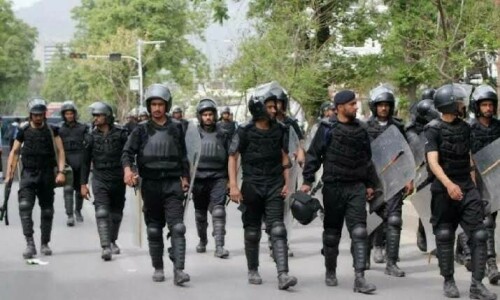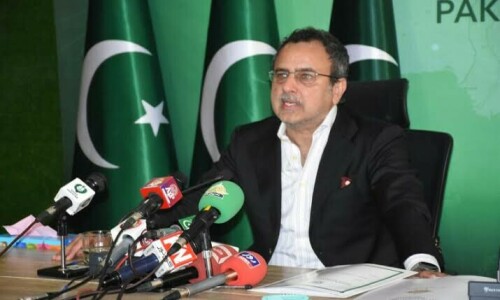WHAT does it take to create consensus against extremism in Pakistan?
Slightly over a decade into the fight against terrorism, the lens through which we view reality has become more than a little skewed.
What would have seemed impossible just a few years ago has, slowly but surely, been normalised. Wanton killing and a fresh outrage more or less everyday.
Not so long ago, we would have said that the people wouldn’t stand for it, that public opinion against the perpetrators would be of a sufficient magnitude to create a critical mass and disallow the state from remaining indifferent.
But experience teaches otherwise. Where solid rock cannot in the long run withstand the steady drip of water, something as amorphous as public opinion doesn’t really have a chance.
Little by little, what was once too far outside the pale to be contemplated becomes part of everyday life; slowly but inevitably we grow used to new, tougher and more restricting realities. And, of course, Pakistan is hardly alone in this experience.
Across the world, people have over a decade and a bit got used to limits on their freedoms in the brave new world, transgressions by their governments that would earlier not have been thought possible.
People would have thought, when war was being contemplated with Iraq, that millions of people out on the streets in protest across the world’s capitals would have been enough to demonstrate that public opinion ran against the official line, and to stay the hand of governments. The record, though, shows otherwise.
Even so, that much looked for ‘consensus opinion’ can, on occasion, come to a point and turn the tide. Pakistan saw this a few years ago, when Swat was under thrall of the Tehrik-i-Taliban Pakistan (TTP). Public opinion against the extremists had more or less been divided until 2009, even through the country had for years withstood escalating violence and a clearly emergent new threat.
But till just three years ago public opinion in general in Pakistan could not decide whether or not the TTP, which blanketed its murderous ideology under the garb of religion, was fighting the right fight. There were too many apologists who oscillated confusedly between opprobrium at what the group actually did and approval of the line it peddled.
It had more or less become clear that something would have to be done for the state to recover control over the once-bustling tourist destination of Swat, but there was too much confusion over what felt uncomfortably like the government declaring war against a section of its own population and one, moreover, that was at least in theory arguing for something that few Pakistanis would — again in theory — reject.
Curiously, though — for this is a country where women are routinely victimised and discriminated against — it took seeming brutality against one unknown woman to force public opinion out of its dazed slumber.
The TTP apparently flogged a girl; and finally, people started talking about whether the end justifies the means. After all, the abhorrent transgressions that were there for all to see, somehow this became the point where things were regarded as having gone too far.
In retrospect, that shift in the mood of the citizenry at large was what offered the state and the army the support needed to undertake a military operation in the valley (though how much long-term good that manoeuvre achieved remains a moot point, given that the TTP and their like remain a clear and present danger). The two houses of parliament passed a unanimous decision in favour of the operation in the Malakand division.
Currently, we seem to again be at a similar point of rare general consensus. This time, the person at the heart of the outrage is a child — also one of a group that is routinely subjected to violence in this country.
The shooting of Malala Yousufzai seems to have been repugnant enough for a sufficient number of people to stand up in anger. A Joint Chiefs of Staff Committee meeting has vowed to render any sacrifice that is required to fight back against terrorists, and Prime Minister Raja Pervez Ashraf has declared that “we pledge that we will not surrender the soul of the nation to them”.
Calling for unity against a threat from a “bigoted and radicalised mindset”, he termed the shooting “an attack on our core moral and social values”.
These are strong words, coming from the highest tiers of government. Many hope that they indicate a willingness on part of the state and its functionaries to undertake a military operation in North Waziristan, the wisdom of which has long been debated.
Whether or not such an operation would attain its goal, though, might be considered an open question. So far, all that military manoeuvres have largely achieved is to push militants out of one area, only to have them surface elsewhere. And this is partly because in society at large, the rhetoric they peddle still earns currency.
What Pakistan needs to recognise is that the TTP may be the enemy, but it is not the only one. The enemy has many faces, possibly yours and mine included. This much at least can be read into the fact that amongst the groups professing outrage against the attack on Malala was the Jamaatud Dawa, the charity wing of the militant Islamist group Lashkar-e-Taiba.
The problem is that the groups at the far end of the extremist slab are so, well, extreme, that those even slightly towards the centre seem by comparison relatively benign. And that misassumption masks the path to hell.
The writer is a member of staff.
hajrahmumtaz@gmail.com









































